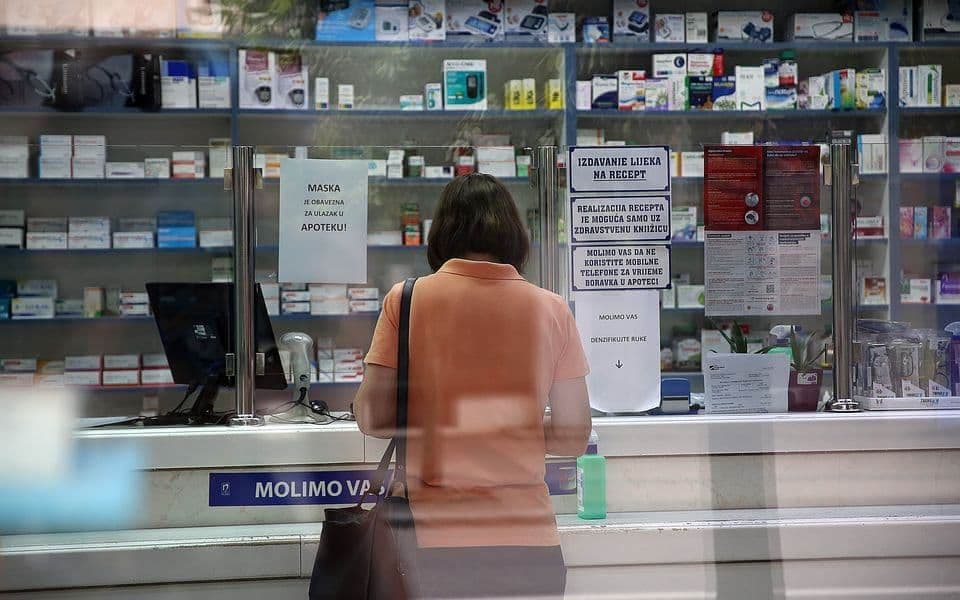Lifestyle
Rising Medicine Costs Hit Pensioners and Chronic Patients Hard

The escalating prices of medications are placing significant financial strain on pensioners and chronic patients in Montenegro. According to former director of the Fund for Health Insurance, Sead Čirgić, the increase in drug costs is primarily due to rising consumption without adequate system controls. This situation is particularly burdensome for those who rely heavily on the healthcare system and have the least ability to manage additional expenses.
Čirgić emphasized the need to examine what has changed over time to understand the current crisis. He noted that the procurement and distribution system remains unchanged, and the list of medications continues to be among the best in the region. Despite the consistency in prescribing practices and maximum price regulations, the factors contributing to the surge in prices are significantly different today.
A major influence on the current situation is the introduction of populist programs like the “Europe Now” initiatives, which have inadvertently weakened access to healthcare. This has coincided with a restructured list of medications that imposes greater financial burdens on patients. The presence of over 100,000 foreigners with regulated residency in Montenegro, who have the same rights to healthcare, also complicates matters. Furthermore, there has been a notable decline in the control of prescription practices, which had previously been improved by better information solutions.
In stark comparison, while the European Union has seen a modest increase in drug prices of only 2.1%, and 1.6% in the eurozone, Montenegro has experienced a staggering 14.5% rise. The out-of-pocket expenses for citizens on medications reached €60 million in 2024, a threefold increase from previous years. Annual healthcare expenditure has surged by 10%, more than doubling compared to a few years ago. These figures reflect the performance of health authorities and the government’s overall approach to public health.
In response to inquiries about which specific medications have increased in price, the Fund for Health Insurance directed questions to the Official Gazette, where the relevant data could not be found. They noted that their information comes from the Ministry of Health regarding price changes on the list of reimbursable medications. As of June 1, 2025, the current list includes price reductions for 73 medications, while 21 medications have seen price increases.
The Fund explained that under the Law on Mandatory Health Insurance, insured individuals can purchase medications from the basic list and seek reimbursement if they cannot obtain them through healthcare institutions. Patients who apply for refunds for purchased medications must provide the necessary documentation, including a fiscal receipt.
The Fund allocates financial resources for all medications that are deemed deficient for patients, although there are no specific rules regarding which medications are most frequently reimbursed. However, certain drugs for treating rare epilepsy have been highlighted as needing approval from the Ministry of Health’s commission, due to their unavailability from the central wholesaler, Montefarm. Patients often end up purchasing these themselves, along with medications that are scarce both locally and regionally.
Two local pharmacies confirmed that they have raised the prices of supplements by €2 to €3 per product, and regular therapy medications have also seen price increases. An anonymous pharmacist noted that customers often comment that prices in Montenegro are approximately 30% higher than in neighboring countries such as Bosnia, Serbia, and Albania.
The Ministry of Health has publicly stated that rising medication costs result from increased production expenses, raw materials, energy, transport, and regulatory costs. In March, the government amended the Law on Medicines to limit the maximum prices of prescription drugs not covered by the state list, aiming to curb uncontrolled price hikes and enhance accessibility for all patients.
The burden of these rising costs is evident among pensioners, with Montenegro housing approximately 131,000 pensioners. The minimum pension stands at €450, while the average pension is approximately €548. Many pensioners reported spending significant portions of their monthly income on medication.
One pensioner, who wished to remain anonymous, shared that as a heart patient, she spends around €100 monthly on therapy, which constitutes a substantial portion of her €580 pension. Another pensioner detailed that his medical expenses, which include treatment for carotid disease and vision issues, amount to about €170 monthly, with little assistance from the Fund for Health Insurance.
Patients who have suffered serious medical conditions, such as strokes, expressed frustration over the financial burden of necessary treatments and diagnostic procedures. One patient shared that they spend around €100 monthly on essential therapies, while waiting times for procedures like colonoscopies can extend to nearly six months, forcing individuals to seek costly private care.
The situation highlights a growing concern about the affordability of healthcare in Montenegro, particularly for vulnerable groups such as pensioners and chronic patients who find themselves increasingly squeezed by rising medication costs.
-

 Health3 months ago
Health3 months agoNeurologist Warns Excessive Use of Supplements Can Harm Brain
-

 Health3 months ago
Health3 months agoFiona Phillips’ Husband Shares Heartfelt Update on Her Alzheimer’s Journey
-

 Science1 month ago
Science1 month agoBrian Cox Addresses Claims of Alien Probe in 3I/ATLAS Discovery
-

 Science1 month ago
Science1 month agoNASA Investigates Unusual Comet 3I/ATLAS; New Findings Emerge
-

 Science4 weeks ago
Science4 weeks agoScientists Examine 3I/ATLAS: Alien Artifact or Cosmic Oddity?
-

 Entertainment4 months ago
Entertainment4 months agoKerry Katona Discusses Future Baby Plans and Brian McFadden’s Wedding
-

 Science4 weeks ago
Science4 weeks agoNASA Investigates Speedy Object 3I/ATLAS, Sparking Speculation
-

 Entertainment4 months ago
Entertainment4 months agoEmmerdale Faces Tension as Dylan and April’s Lives Hang in the Balance
-

 World3 months ago
World3 months agoCole Palmer’s Cryptic Message to Kobbie Mainoo Following Loan Talks
-

 Science4 weeks ago
Science4 weeks agoNASA Scientists Explore Origins of 3I/ATLAS, a Fast-Moving Visitor
-

 Entertainment4 months ago
Entertainment4 months agoLove Island Star Toni Laite’s Mother Expresses Disappointment Over Coupling Decision
-

 Entertainment3 months ago
Entertainment3 months agoMajor Cast Changes at Coronation Street: Exits and Returns in 2025









